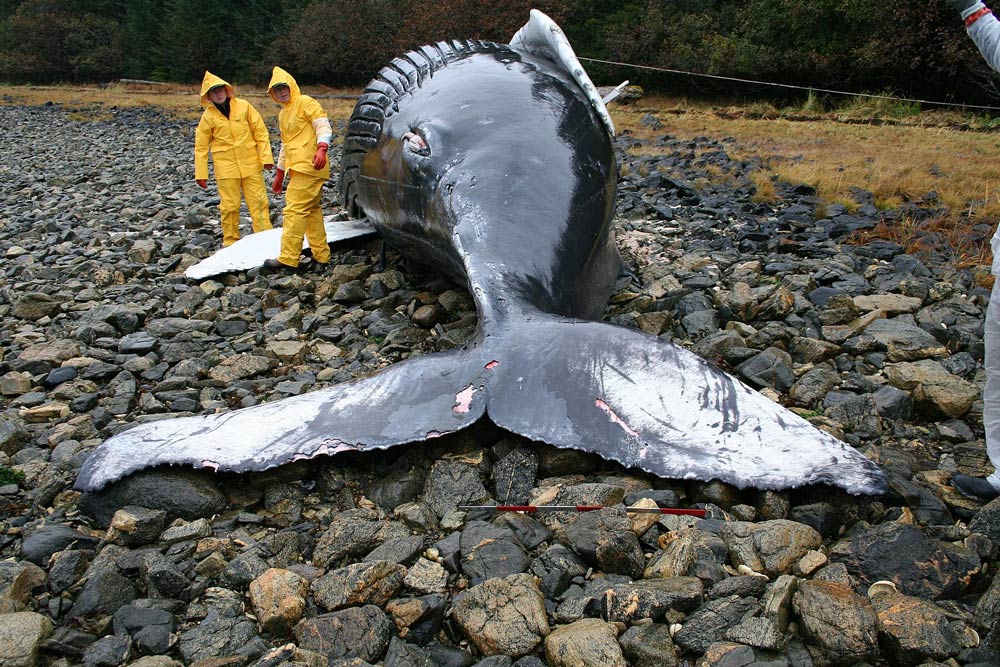Over 50 Pilot Whales Lose Their Lives in Mass Stranding
Matthew Russell
Wikimedia Commons / Aleria Jensen, NOAA/NMFS/AKFSC
Beachings of marine mammals, particularly whales, continue to be a distressing occurrence around the world. These incidents not only pose a significant threat to the survival of these magnificent creatures but also raise important questions about their welfare and the actions we should take when encountering a beached whale.
Mass Stranding on the Isle of Lewis
More than 50 pilot whales in the recent beaching incident on the Isle of Lewis, representing the largest mass stranding event in Britain since 2011, the New York Times reports. Despite the efforts of coast guards, police, and rescue volunteers, the majority of the stranded whales, both adults and calves, had already perished by the time responders arrived. The rough waves and shallow beach conditions further complicated the rescue operation, leading the rescue teams to make the difficult decision to euthanize the surviving whales for their own welfare, CNN reports.
 Photo: Beached Cuvier's Beaked Whale (28740971527), Wikimedia Commons / Silver Leapers, License: CC BY-SA 2.0 DEED
Photo: Beached Cuvier's Beaked Whale (28740971527), Wikimedia Commons / Silver Leapers, License: CC BY-SA 2.0 DEEDBeached whale encounters demand immediate action with safety and compassion.
Understanding the Plight of Stranded Whales
Whales, particularly pilot whales, are highly susceptible to beaching incidents due to their strong social bonds and complex navigation systems. These intelligent marine mammals, belonging to the same family as dolphins and porpoises, can grow up to 24 feet in length and weigh over 6,600 pounds. When stranded, they face various risks, including self-inflicted injuries due to the pressure of their own weight or impaired blood circulation, leading to toxin release and subsequent poisoning. The social nature of pilot whales further compounds the problem, as the entire pod may follow a distressed individual ashore.
 Photo: Wikimedia Commons / Aleria Jensen, NOAA/NMFS/AKFSC, License: Public Domain
Photo: Wikimedia Commons / Aleria Jensen, NOAA/NMFS/AKFSC, License: Public DomainContact relevant authorities, such as coast guards or marine rescue organizations, to report the sighting of a beached whale.
The Frequency and Causes of Beachings
According to the Fish & Wildlife Foundation of Florida, beachings of cetaceans, the class of animals encompassing whales, dolphins, and porpoises, have been a subject of concern for decades. The Cetacean Strandings Investigation Program of the Zoological Society of London has recorded over 17,000 stranded cetaceans since its inception in 1990. While pilot whales are considered the species "most prone" to beachings, the causes behind these incidents can vary widely.
Sonar activity, including naval sonar exercises, has been linked to whale beachings, as the loud underwater noise can disorient and confuse the animals. Additionally, a sick or injured whale within a pod can lead others astray, exacerbating the risk of beachings. In some cases, whales may follow an individual that has faced difficulties during childbirth, as was suggested in the recent Isle of Lewis stranding.
According to " target="_blank">the Telegraph, Scotland's largest previous stranding event took place in July 2011 at the Kyle of Durness in Sutherland, resulting in the death of 19 whales out of a pod of 70. Government scientists later attributed this tragic incident to the detonation of four large bombs underwater by the Royal Navy. A report from the Department for Environment Food and Rural Affairs revealed that the noise generated by these explosions could have harmed the whales' hearing and navigational capabilities, leading to their beaching and subsequent death.
 Photo: Wikimedia Commons / Everglades NPS, License: Public Domain
Photo: Wikimedia Commons / Everglades NPS, License: Public DomainAwait professional assistance from rescue teams with specialized knowledge and equipment.
The Urgent Need for Response and Solutions
The successful rescue of stranded whales requires a coordinated and rapid response. However, challenging circumstances can hinder these efforts. The remote location of the stranding site on the Isle of Lewis, with limited access and scarce resources, posed significant obstacles for rescue teams. Nevertheless, such incidents highlight the importance of developing effective communication channels, ensuring an adequate number of volunteers, and equipping responders with the necessary tools and expertise.
To determine the cause of beachings, organizations like the Scottish Marine Animal Stranding Scheme (S.M.A.S.S.) conduct thorough investigations, collecting tissue samples and analyzing data, the Times reports. Understanding the underlying factors contributing to beachings is crucial in implementing preventive measures and mitigating future incidents. While the conclusions may take weeks or months to establish, these studies are essential for guiding conservation efforts and policy decisions.
https://youtu.be/PPr5BbMo5cA
What To Do When You Encounter a Beached Whale:
Encountering a beached whale can be a distressing and urgent situation. If you find yourself in such a circumstance, it is crucial to prioritize the safety and well-being of both the whale and yourself. Here are some recommended steps to take:
1. Contact the Authorities
Immediately report the sighting of a beached whale to the relevant authorities, such as the coast guard, local marine rescue organizations, or wildlife agencies. Provide precise details about the location, size, and condition of the whale to facilitate an effective response.
2. Keep Your Distance
Maintain a safe distance from the beached whale to avoid causing further distress or injury. Whales are powerful creatures, and their movements can be unpredictable, even when stranded.
3. Minimize Noise and Disturbances
Whales are sensitive to noise, so it is essential to minimize unnecessary sounds and disturbances in the vicinity. This includes refraining from approaching the whale, using loudspeakers, or operating any machinery nearby.
4. Await Professional Assistance
Rescue teams with specialized knowledge and equipment should handle the rescue and rehabilitation of beached whales. Wait for their arrival and follow their instructions carefully. In some cases, it may be necessary to euthanize a stranded whale for humane reasons.
5. Educate Others and Raise Awareness
Spread awareness about the risks whales face and the appropriate actions to take in the event of a stranding. Educate your community, friends, and family about the importance of marine conservation and the need to protect these magnificent creatures and their habitats.
 Photo: Wikimedia Commons / Palamède, License: CC BY-SA 4.0 DEED
Photo: Wikimedia Commons / Palamède, License: CC BY-SA 4.0 DEEDIn some cases, it may be necessary to euthanize a stranded whale for humane reasons.
A Call for Conservation and Collaboration
The rising risks whales face through beachings demand concerted efforts to ensure their survival and the preservation of marine ecosystems. By supporting marine conservation organizations, advocating for responsible environmental practices, and engaging in scientific research, we can make a positive impact on the well-being of whales and other marine species.
Ultimately, our collective actions and commitment to understanding, protecting, and respecting these incredible creatures will determine their fate. Let us stand united in safeguarding their future and working towards a world where beachings are a rare occurrence, allowing whales to thrive in their natural habitats.
Take the pledge and make a difference!
Matthew Russell is a West Michigan native and with a background in journalism, data analysis, cartography and design thinking. He likes to learn new things and solve old problems whenever possible, and enjoys bicycling, spending time with his daughters, and coffee.




















